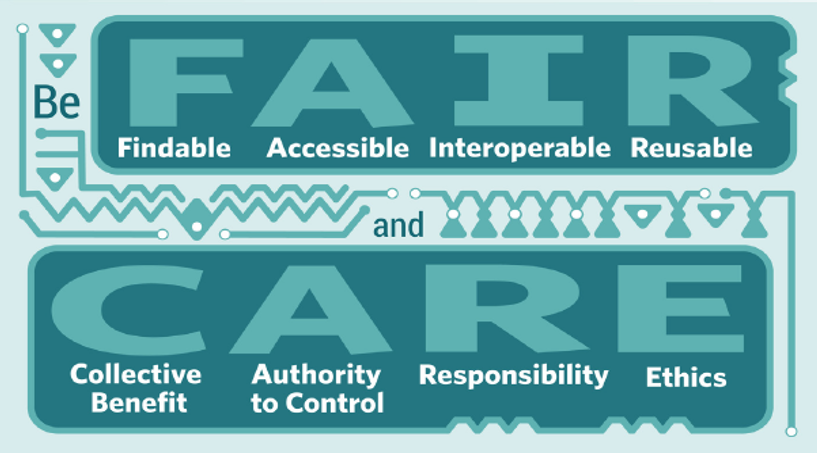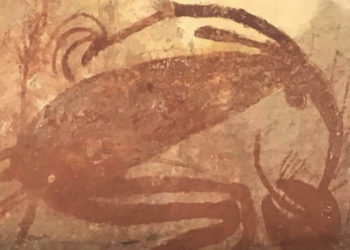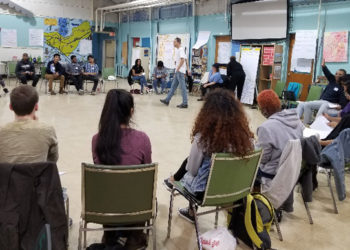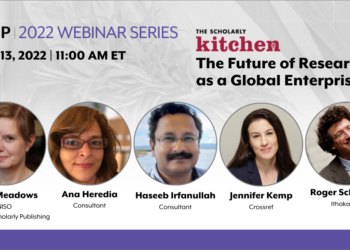Indigenous knowledge, defined by UNESCO as “the understandings, skills and philosophies developed by societies with long histories of interaction with their natural surroundings”, is increasingly — if belatedly — being recognized as making a significant contribution to the research endeavor. However, it is poorly supported by the current research infrastructure, which was developed to serve the needs of the global North, especially in the sciences. Dr Katharina Ruckstuhl of the University of Otago, New Zealand, gave a powerful account of this in her recent NISO Plus keynote, Research Infrastructure for the Pluriverse, as well as sharing her thoughts on how we can can implement research infrastructure processes that support pluriversal approaches.
Coverage of Indigenous knowledge in The Scholarly Kitchen has been woefully lacking — the only post I could find is “Questioning Our Assumptions in Publishing Innovations: Inspiration from the Story of Indigital” by Lettie Conrad (if there are others, please let me know!). So I’m very grateful to Katharina for agreeing to answer some questions — a mix of basic and less so — to help us all advance our understanding of this important area of knowledge.
Katharina is an Associate Professor and Dean at the University of Otago Business School. She is a tribal leader and has many governance and Board roles in her community. She is a current ORCID Board member and a member of the IEEE P2890 working party on Recommended Practice for Provenance of Indigenous Peoples’ Data.

Please can you tell us a bit about your work and your interest in research infrastructure?
My research is founded in my Ngāi Tahu tribal community of Kāti Huirapa ki Puketeraki. We’re based in the east coast Otago region of the southern part of Aotearoa New Zealand. Our rūnaka, or tribal council, has long-standing research relationships with many organizations, including the one I work for. So my research has over the years covered many diverse areas that are relevant to our people — Māori language revitalization, mining and resource extraction, small business development, and now science and innovation. My interest in research infrastructure has evolved from studying science research innovation and the implications for Māori. This is important from many perspectives — ethical, cultural, environmental, and economic.
What do you mean by the pluriverse and what changes are needed in order for the research infrastructure to support it?
My studies have caused me to reflect on the quite different worldviews of Māori and Indigenous people and the science and research system. Often this has seemed quite oppositional. Thus, it is often said that Indigenous world views are holistic, incorporate spiritual beliefs and are place-based with a deep and abiding reverence for the natural world. Many Indigenous people see themselves as ‘related’ or ‘kin’ to their particular environments, in the way that you might be related to human kin. This is certainly the case with my own tribal group. Research, on the other hand, has often been seen by Indigenous people as exploitative. There is a quite well-known quotation from Māori scholar Linda Smith, who has said in her book, Decolonizing Methodologies: Research and Indigenous Peoples that research is probably one of the “dirtiest words in the Indigenous world’s vocabulary.” This is because since early contact periods, whether in the Americas, Asia, Africa, Australia, or the Pacific, researchers in a quest for discovery have acquired knowledge, artifacts, plants, or animals from Indigenous people and territories and then recirculated them for their own purposes, often economic. It is only more recently that there has been an acceptance that this has been the case, particularly when it comes to intellectual property which the Nagoya Protocol has been important to highlighting and then addressing.
The idea of the pluriverse is one that Colombian academic Arturo Escobar has espoused, with particular reference to the experiences of Indigenous and other dispossessed people of Abiayala or South America. And by using the term pluriverse he is saying something similar to how I have explained Indigenous worldviews. These are, if you like, whole cosmologies of understanding and being in the world. When you chip away at, or remove Indigenous people’s knowledge of their worlds, and then transpose that to your database to increase your knowledge, essentially you are removing the right of a particular group to decide how they want that knowledge to be represented or used – or not, as the case may be. This is what Escobar calls a ‘one world world’ approach – where a scientific approach prioritizes universality and knowledge as ‘free’. And so a pluriversal approach is really one where there is a need to entangle with the other world – not see it as ‘primitive’ or ‘superstitious’ or ‘under-developed’ — but as one that has a complex system of existence. This then leads to a different way of doing research across all its phases, including challenging some of the premises of how we do research.
Are any of these changes already starting to happen? If so, who is working on them — and who else should be involved?
We have to be very clear here that entangling worldviews is not about trying to assimilate the other’s knowledge into your frame of reference. We have seen many disastrous attempts where assimilationist policies have had grave and ongoing consequences for Indigenous peoples – the ‘stolen children’ in Australia and Canada being examples of that.
Some of the changes I am aware of are happening at different levels of research infrastructure. For example, in the past, individual researchers in the biological sciences may have taken samples of flora and fauna for further analysis. While they may have done this ‘in good faith’ with a local community, what has happened next may not appear so. In France there has been a case where an anti-malarial drug was patented from a sample derived from traditional indigenous knowledge. No acknowledgement was made of this, and in this case the researchers and their institution had to agree to a benefit sharing agreement with the government of the Indigenous group. Being forced into acknowledging Indigenous knowledge rights after the fact is not uncommon, however, there is now more awareness of doing the right thing from the start. So building in policies at the institution level to govern access to Indigenous materials, such as the Canadian OCAP® principles, is a way to ensure good practice.
How has the lack of infrastructure support for pluriversal approaches impacted your own work?
To be honest, it’s always hard work advocating for a worldview that is not ‘mainstream’. Often our worldview gets put into, as we call it in Aotearoa New Zealand, the ‘brown box’. That is, Māori have only been associated with certain domains. In reference to Australian Aboriginal and Torres Island peoples, Maggie Walter calls these the “5Ds” of difference, disparity, disadvantage, dysfunction, and deprivation. So these are ‘problems to be solved’, often by others – sometimes well-meaning, often not. Shifting that thinking to accepting the complexity of Indigenous life, and from an ideology of the ‘one world’ and one approach to research to a framework where Indigenous people control the narrative and the tools, is not easily undertaken where universal access to knowledge is deemed ‘free’.
Your recent article looks at data sovereignty from the perspective of Indigenous peoples. What is data sovereignty, and why is it so important?
Data sovereignty as a concept is now quite universal. As I note in the article, data sovereignty can relate to individual, collective, or Nation State rights to control data whether within a nation or across countries. Data sovereignty is also associated with privacy, information flows, ownership, inclusiveness, and the representation of different groups into decisions about how data is used or re-used. The latter in particular applies to Indigenous people, who often see and call themselves nations, whether they are nations within Nation States, such as in the US or Canada, or where there is a strong and distinguishing nation identity, as there is in my country of Aotearoa New Zealand. Indigenous data sovereignty derives from this nation-building movement and has been defined as the right of Indigenous peoples to control the collection, governance, ownership, and application of data about their people, lifeways, land, and resources. It’s both the ability to make decisions about how research and other data may be used by others (governance of data) but also how it can inform tribal decision-making (data for governance).
The article covers data in a wide range of contexts — from biobanks to cultural institutions. Can you give us some examples of the unique challenges around data from, for, and about Indigenous communities?
Most data is not under Indigenous or tribal control. That is everything from huge volumes of research data around genetic material – whether animal, plant, or human – to cultural knowledge, to data about actual physical artifacts in galleries, libraries, museums, or other storehouses. Often such data is missing provenance, or may have incorrect provenance. And often access protocols are absent or not recognized, which is an issue when particular items should have sacred or restricted access from a tribal perspective. Then there are issues around ownership. For example, copyright belongs to the person who took an image or recording of an Indigenous person or group. There is no ability to restrict or give permissions. I’ve raised the issue of intellectual property rights around use of data, including secondary re-use. This can occur when traditional knowledge is used to identify particular properties – such as efficacy against malaria or some other disease. That research data can then be used for new formulations, potentially making significant profits for a company, but without recognition of where the original knowledge came from.
These issues have led to a global movement to find solutions. For example, in my article I give examples of how some tribal groups are developing their own biobanks or are working with existing biobanks to develop access and governance protocols. There have also been calls to repatriate biocultural collections to their original owners. There’s also been a movement to improve metadata about Indigenous collections. For example Traditional Knowledge (TK) and Biocultural (BC) Labels, licenses, and notices are an emergent digital rights tool that can be appended either by tribal groups themselves to their online databases to show what may or may not be shared. Or, institutions can use the notices to show that they have material that may require further Indigenous labeling, provenance, or permissions. This approach started in the US about 10 years ago, but has been expanded globally through an online platform called Local Contexts.
Many readers will be familiar with the FAIR data principles; what are the CARE principles that you refer to in both your presentation and your article?
The CARE principles (Collective Benefit, Authority to Control, Responsibility, and Ethics) are a response to FAIR. So while FAIR focuses on data oriented principles to improve flow of data, the CARE principles ask researchers and those who manage or control research infrastructures to examine the data lifecycle from a people and purpose orientation. For example, Stephanie Russo Carrol and others have argued that collective benefit might be realized when data ecosystems reflect communal values; when Indigenous people are able to control their data (such as through TK labels); when researchers and their institutions and funders engage responsibly, which includes developing community data capability; and when there is an ethical approach to minimize harm and maximize benefit – so not just focusing on the 5Ds.
How can these principles help build trust in scholarly communications and infrastructure within Indigenous communities?
If we want research to continue to be done with Indigenous communities, then the types of principles espoused in the CARE approach offer a great insight into Indigenous expectations. At every level of the research lifecycle — from the accessing of raw data, whether qualitative or quantitative, to its storage in databases, then onto its analysis, eventual publication, and potentially secondary re-use of originating data — principles like CARE and the other tools and approaches that have and are being developed can guide researchers, institutions, owners of infrastructure, and those who disseminate research. Indigenous people are as interested in promoting knowledge discovery and innovation as anyone else – however the process by which this happens needs to be much more attentive to the collective aspirations and approaches that are Indigenous grounded.
It’s clear from the discussions at NISO Plus and elsewhere that there’s a need for action to ensure that the research infrastructure supports Indigenous knowledge — talk is not enough! What should our top priorities be?
There’s been a lot of talk and maybe some action around diversity, inclusion, and equity. That’s a great start, but for Indigenous people there needs to be an examination of the “core” machinery of scholarly infrastructure — universities, ethics committees, funders, publishers, and others. Part of this examination and a consequent response may include applying digital rights management protocols, such as the TK and BC Labels and Notices. This is something that ORCID is looking at by working with Local Contexts. There’s also a need to think about Indigenous data provenance and how this may be scaled from the individual repository to a global standard – something that the IEEE Standards Association is working through at the moment.
So these potential tools and solutions are already being worked on – however as with all things there is a need for implementation with willing partners. So perhaps, if nothing else, just starting to be alerted to these issues, and knowing that someone may actually ask you what you are doing, is a first step!
Discussion
5 Thoughts on "Indigenous Knowledge and Research Infrastructure: An Interview with Katharina Ruckstuhl"
Thank you for such a great article! At Canadian Science Publishing we are striving to ensure that indigenous knowledge is reported and acknowledged properly in the articles we publish. Any advice is gratefully received. We recently published this guide to reporting community-engaged research
https://cdnsciencepub.com/authors-and-reviewers/community-engaged-research
Alice and Katharina, Thanks so much for this terrific conversation. There is definitely a need for more examination of these issues and more and better services and frameworks to support them. In case you have not seen it, several years ago colleagues at Ithaka S+R facilitated a partnership with 11 colleges and universities in Canada, the US, and Hawaiʻi “with the goal of identifying services to better support [Indigenous Studies scholars] in ways that are also beneficial to Indigenous communities more broadly.” In case of interest, the aggregated report from that work is available here: https://sr.ithaka.org/publications/supporting-the-research-practices-of-indigenous-studies-scholars/
Great stuff! The journal I edit, Scholarly and Research Communication, would be very interested in helping to spread the word about the principles and practices that you bring forward in this interview, Katharina.
Thanks Elaine for the guidelines. These are very useful and practical tips that are worth sharing more broadly. Roger – the principles in the project are very familiar across a number of different Indigenous groups.
Thanks Elaine and Roger – good to know about both these resources!



